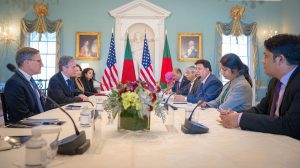In recent weeks, Bangladesh has witnessed several intimidating attacks on journalists and their relatives, putting fresh constraints on its increasingly pressured media.
In March, a mob beat Mahinur Khan, the brother of Zulkarnain Saer Khan, a Bangladeshi investigative journalist living in exile, with rods. “Your brother writes about the PM? Against the government? He is a journalist? We will show you now,” the people reportedly said as they thrashed Mahinur.
Zulkarnain had contributed to a damning Al Jazeera investigative documentary “All the Prime Minister’s Men,” which alleged that Bangladesh’s powerful political and military elites are subverting the rule of law to indulge in corruption. No one has been arrested yet for the attack on Zulkarnain’s brother.
The attack on Mahinur reaffirms an emerging disturbing pattern of violence that is aimed at silencing and suppressing exiled journalists.
This is a challenging time for freedom of the press in Bangladesh. The latest World Press Freedom Index places Bangladesh at the 162nd, worse than Cambodia, Russia, and Venezuela – countries known for their authoritarian rule.
Bangladesh’s flawed democracy is now sliding back into authoritarianism. Global democracy indicators have labeled the country as a hybrid regime, an electoral autocracy, and an autocracy.
This trend of Bangladesh’s authoritarian turn under a civilian government is a sharp break from the country’s past political history, where military rulers used to govern through authoritarian governments.
A few days after Zulkarnain Saer Khan’s brother was beaten, Matiur Rahman, the editor of the Daily Prothom Alo, the largest and most influential Bengali news daily in Bangladesh, was sued under the draconian Digital Security Act (DSA) for publishing what the government says is “false news.” Plain-clothes men picked up Shamsuzzaman Shams, a reporter of the Prothom Alo, from his home at 4 a.m. and later charged him under the DSA.
The problem with the DSA is that it is abstract in nature and a wide range of offenses under this law are considered non-bailable. It allows police to arrest anyone without a warrant and send them to jail. A study by the Center for Governance Studies noted that Bangladesh’s ruling Awami League and state officials have weaponized the DSA to harass journalists and opposition politicians.
Both Matiur and Shams were sued because the Prothom Alo published a report by Shams that highlighted the daily struggle of Bangladeshis to make ends meet amid the ongoing economic crisis in the country. The report quotes a day laborer and a boy who sells flowers. The latter was quoted as saying that he expected to sell more flowers that day as it was Bangladesh’s Independence Day, whereas the day laborer said, “You break out into sweat if you go to the market. We need independence for fish, meat and rice (adequate meals).”
The Prothom Alo erred in wrongly attributing the laborer’s quote to the young flower seller, which it accepted and corrected.
What drew the AL government’s ire was that the article drew attention to the struggles of Bangladeshis due to the weakening economy. It was seen as an insult to the government’s “development narrative.”
The Prothom Alo came under heavy attack from the government. It was accused of paying the flower seller to talk ill about the economy. AL supporters in Bangladeshi civil society organized human chains demanding the cancellation of the newspaper’s license. In parliament, Prime Minister Sheikh Hasina attacked the newspaper as “the enemy of Awami League, democracy and [the Bangladeshi] people.” Following that speech, a mob vandalized the Prothom Alo’s office and threatened it with a boycott.
In a statement following the harassment of the Prothom Alo’s editor and reporter, Amnesty International said: “The use of the draconian Digital Security Act on journalists and attacks on some of the largest news publications in the country together indicate a worrying trend towards repression and a downward spiral of the right to freedom of expression in Bangladesh.”
Demanding immediate suspension of the DSA, the United Nation’s Chief Human Rights Officer said, “I am concerned that the Digital Security Act is being used across Bangladesh to arrest, harass and intimidate journalists and human rights defenders, and to muzzle critical voices online.” A U.S. State Department spokesperson described the DSA as one of the world’s most draconian laws for journalists.
Following a national and international outcry, Prothom Alo editor Rahman was granted anticipatory bail, and reporter Shams was released from jail. While they are not fully off the hook, they are safe for now.
Against the backdrop of the temporary release of the Prothom Alo editor and reporter, a pertinent question is why the Bangladeshi government backed down. A strong authoritarian government would not have released the journalists so quickly.
A probable explanation for the Hasina government’s walk-back is that it knows it is under the international spotlight. Bangladesh is due to vote in general elections in less than a year. The 2014 and 2018 national elections were not deemed fair by Western liberal democracies, including the United States. The U.S. has already imposed sanctions on six officials of Bangladesh’s elite special force, the Rapid Action Battalion (RAB), for committing grave human rights violations.
In a recent meeting with Bangladeshi Foreign Minister A.K. Abdul Momen, U.S. Secretary of State Antony Blinken reiterated the need for Bangladesh to ensure that elections are free and fair and that freedom of expression is protected.
With the economy weakening, the opposition Bangladesh Nationalist Party (BNP) getting re-energized and more organized ahead of general elections, and under the close watch of the U.S., perhaps the Hasina government is now rethinking its strategy of intensifying its crackdown on the media.
Hasina’s go-slow on silencing the media could also be a ploy to avoid more attention on the freedom of speech situation in Bangladesh during her bilateral talks with governments during her upcoming 15-day visit to Japan, the U.S., and the U.K.













